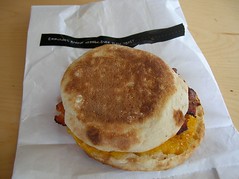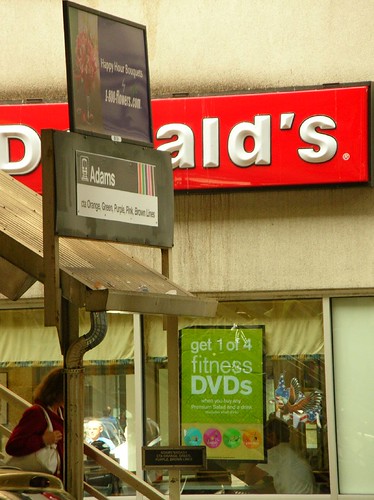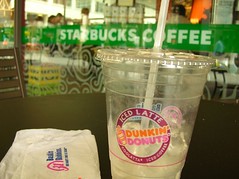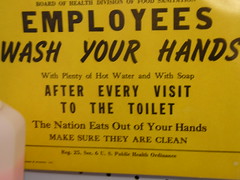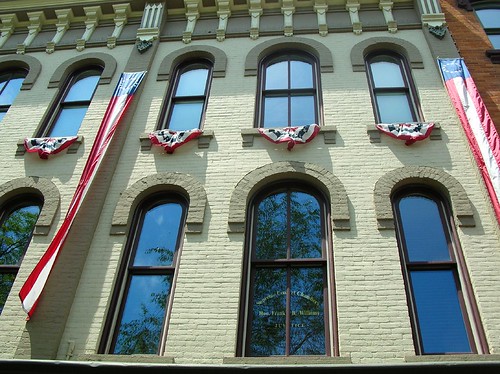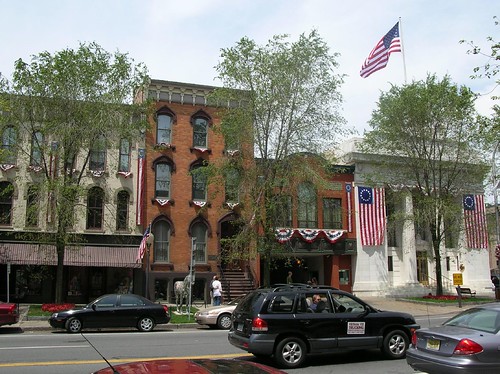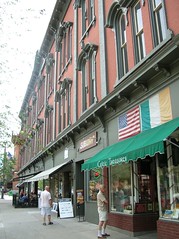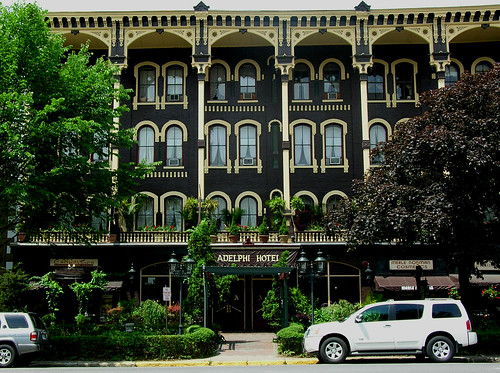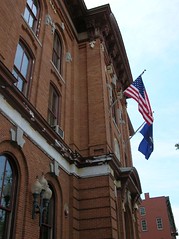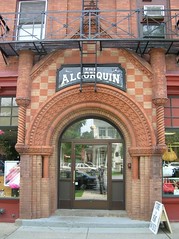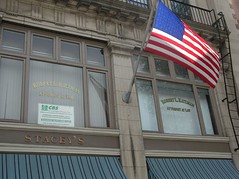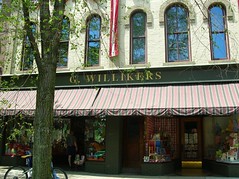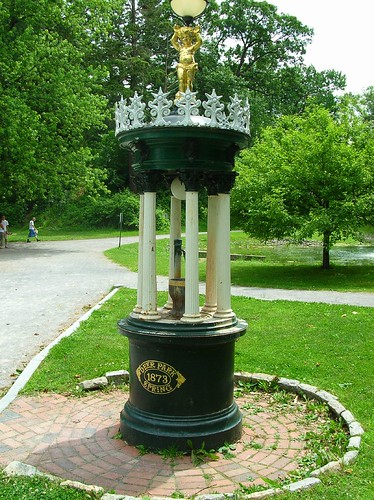Monday, July 31, 2006
Language creativity
Responding to my post yesterday, Tonya muses about whether she has just coined the term "cringeworthy." Well, in fact, she admits that she did:
I used to believe I had invented the word "megabucks." I used the word in a college newspaper column in the late 1970s, several years before the word became popular (during the 1980s Wall Street boom). I swear to this day that I had never previously heard or read the term. And the term "mega" stuck in front of an English word wasn't really popular back in the 1970s. But then I found in some lexicography or etymology book that there was a printed use of the "megabucks" dating back to 1948.
Anyway, getting back to Tonya and her new word: Nowadays, if you think you may have invented a word, it's handy to Google it. The absence of a word on Google doesn't prove that the word is not in use, but its presence on Google might tell you the opposite. A Google search for "cringeworthy" yields 174,000 results.
Tonya, I hope that doesn't make you cringe, or even wince. As Mr. Verb pointed out in your comments, you undoubtedly went through the same creative process as those other 174,000 people -- like Newton and Liebniz independently discovering calculus at the same time.
Turns out that I did make up that term -- Ira [Glass] does use the term cringe-a-thon, however -- but I'm not gonna pat myself on the back too much. I think that ever since that Spongeworthy episode of Seinfeld, it's been common for people (or at least me) to add "worthy" as a suffix to existing words to create a new word that describes whether some thing qualifies for some other thing.Putting a new word into American lingo has been a goal of mine for many years. Remember, I tried to launch "eyedar" using this blog and its 40-50 regular readers as a vehicle. People had uttered "eyedar" in the past, but not to mean the uncanny ability of women to detect when their male companion is checking out another woman. But my "launch" of "eyedar" doesn't seem to have worked so far. It's not easy to invent a new word, particularly if you're not a high profile person.
I used to believe I had invented the word "megabucks." I used the word in a college newspaper column in the late 1970s, several years before the word became popular (during the 1980s Wall Street boom). I swear to this day that I had never previously heard or read the term. And the term "mega" stuck in front of an English word wasn't really popular back in the 1970s. But then I found in some lexicography or etymology book that there was a printed use of the "megabucks" dating back to 1948.
Anyway, getting back to Tonya and her new word: Nowadays, if you think you may have invented a word, it's handy to Google it. The absence of a word on Google doesn't prove that the word is not in use, but its presence on Google might tell you the opposite. A Google search for "cringeworthy" yields 174,000 results.
Tonya, I hope that doesn't make you cringe, or even wince. As Mr. Verb pointed out in your comments, you undoubtedly went through the same creative process as those other 174,000 people -- like Newton and Liebniz independently discovering calculus at the same time.
Sunday, July 30, 2006
Calling Mr. Verb
Cringe and Wince
This post by Tonya put me in mind of a linquistic issue that's been irritating me like a hangnail. Mr. Verb, what is the name for this process -- using a similar, sound-alike word in place of the "dictionary-correct" word?
Here are two words that sound alike, and whose dictionary definitions, while overlapping, have a subtle but significant difference. According to the American Heritage Dictionary*:
As you can see, people are using "cringe" when they mean "wince." While both cringe and wince involve physical shrinking back, it's fear-based in "cringe" but more broadly pain-based (including the pain of embarassment or shame) in "wince."
You can see the attraction in preferring "cringe." It sounds more like the desired meaning. And "cringeworthy" -- as in the "cringeworthy story" Tonya was telling -- sounds so much better than "winceworthy."
At some point, the dictionary definitions have to conform to real-world usage, right? Maybe cringe and wince are now synonyms in fact. Only pedants will insist on "correcting" people who say "cringe" to mean "wince."
The pedants do have one point, though: when cringe primarily means wince, what word do we have to describe the demeanor of, for example, Golum in Lord of the Rings? I guess there's still "cower."
____
*Is there a good online, preferably free, dictionary? This one kinda sucks.
** Right on the border between metonomy and synecdoche. Do you notice how this is a blog in which the word "synecdoche" will appear the day after the word "boner"? "Boner," by the way, is often used as a synecdoche.
This post by Tonya put me in mind of a linquistic issue that's been irritating me like a hangnail. Mr. Verb, what is the name for this process -- using a similar, sound-alike word in place of the "dictionary-correct" word?
Here are two words that sound alike, and whose dictionary definitions, while overlapping, have a subtle but significant difference. According to the American Heritage Dictionary*:
cringe: 1) To shrink back, as in fear; cower. 2) To behave in a servile way; fawn."Cringe" has become the word of choice signifying the emotional pain that accompanies intense embarassment. It's a figure of speech,** since the "cringe" is presumably the physical expression of the pain. This is how Tonya used "cringe" (and the delightful "cringeworthy") in her post, and how Ira Glass used it in the This American Life episode Tonya was riffing on.
wince: To shrink or start involuntarily, as in pain or distress; flinch.
As you can see, people are using "cringe" when they mean "wince." While both cringe and wince involve physical shrinking back, it's fear-based in "cringe" but more broadly pain-based (including the pain of embarassment or shame) in "wince."
You can see the attraction in preferring "cringe." It sounds more like the desired meaning. And "cringeworthy" -- as in the "cringeworthy story" Tonya was telling -- sounds so much better than "winceworthy."
At some point, the dictionary definitions have to conform to real-world usage, right? Maybe cringe and wince are now synonyms in fact. Only pedants will insist on "correcting" people who say "cringe" to mean "wince."
The pedants do have one point, though: when cringe primarily means wince, what word do we have to describe the demeanor of, for example, Golum in Lord of the Rings? I guess there's still "cower."
____
*Is there a good online, preferably free, dictionary? This one kinda sucks.
** Right on the border between metonomy and synecdoche. Do you notice how this is a blog in which the word "synecdoche" will appear the day after the word "boner"? "Boner," by the way, is often used as a synecdoche.
Saturday, July 29, 2006
Random thought
Why aren't there dogs named "Boner"?
I mean, I know why, but -- why didn't it become a popular name for dogs before it became a popular name for... the other thing?
It's such a cute, old-fashioned name for a dog. You could imagine Boner playing quite happily with Rover, and Old Yeller, and Fang. Well, maybe not Fang.
For some reason, I woke up this morning with that thought.
I mean, I know why, but -- why didn't it become a popular name for dogs before it became a popular name for... the other thing?
It's such a cute, old-fashioned name for a dog. You could imagine Boner playing quite happily with Rover, and Old Yeller, and Fang. Well, maybe not Fang.
For some reason, I woke up this morning with that thought.
Friday, July 28, 2006
Existential Friday: Sod to Vancouver Island
... or Nature as a Potemkin Village
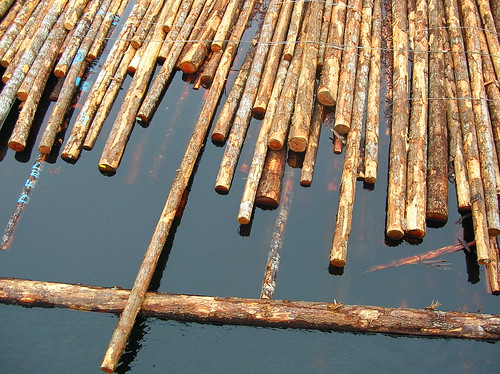
In my sojourn to Vancouver Island last month, I was struck by the seeming oddity of a truck full sod waiting at the ferry terminal to make the trip from the mainland to Vancouver Island. Why would a place so lush and green as Vancouver Island need to import sod from the mainland?

"Sod to Vancouver Island," I thought, could be the Canadian version of "coals to Newcastle," the homespun homily referring to redundancy. Except when you think about it, the green on Vancouver Island is moss and ferns and rain forest, not lawns. The importation of lawns means real estate development.
And then there's logging. In wilderness areas in the U.S., the logging strategy is apparently to leave the landscape unspoiled near the roads, and do the heavy deforestation a bit further in where most National Park tourists won't see it. It's nature as a Potemkin Village.
Canadians don't observe such niceties. On Vancouver Island, at least, the logging activity is pretty much in plain view of the tourists. On the seaward side of the road, you've got national parkland. On the inland side of the road, it's another story. We heard that the island is currently about 75-90% logged out. Well, bring in some sod!





In my sojourn to Vancouver Island last month, I was struck by the seeming oddity of a truck full sod waiting at the ferry terminal to make the trip from the mainland to Vancouver Island. Why would a place so lush and green as Vancouver Island need to import sod from the mainland?

"Sod to Vancouver Island," I thought, could be the Canadian version of "coals to Newcastle," the homespun homily referring to redundancy. Except when you think about it, the green on Vancouver Island is moss and ferns and rain forest, not lawns. The importation of lawns means real estate development.
And then there's logging. In wilderness areas in the U.S., the logging strategy is apparently to leave the landscape unspoiled near the roads, and do the heavy deforestation a bit further in where most National Park tourists won't see it. It's nature as a Potemkin Village.
Canadians don't observe such niceties. On Vancouver Island, at least, the logging activity is pretty much in plain view of the tourists. On the seaward side of the road, you've got national parkland. On the inland side of the road, it's another story. We heard that the island is currently about 75-90% logged out. Well, bring in some sod!




Thursday, July 27, 2006
Honor bar
I don't get why hotels are increasingly referring to the in-room snack bar -- what they used to call a "mini-bar" -- as an "honor bar."
There's no honor in it -- only the dishonor of paying grotesque markups that would make even the most rapacious convenience store blush. Every night I go to bed in a hotel I pray that I will never be that desperate for a package of M & Ms.
If "honor bar" is so named to suggest an "honor system," then we have on our hands a major misnomer that dishonors the notion of trust-based self-reporting systems. Hotels, of course, place their trust in housekeeping staff -- some hired specifically for the purpose -- to keep careful account of items missing from the "honor bar" stock in each room, so that what you take ends up on your bill without the nicety of self-reporting.
Some parents have told me stories suggesting that the honor- or mini- bar presents a opportunity to teach their kids an important life lesson about the complex and intangible nature of property relations. Kids, who have only just learned that they're not supposed to take stuff from stores without paying for it, are often puzzled why they can't just take food items from the mini-bar. It's sitting right there in their living space, after all. Maybe it's now called an "honor bar" so we people can teach their kids about honor.
Look at me -- I'm one of those people whom the Jack Nicholson character was sneering at in the trial scene in A Few Good Men:
There's no honor in it -- only the dishonor of paying grotesque markups that would make even the most rapacious convenience store blush. Every night I go to bed in a hotel I pray that I will never be that desperate for a package of M & Ms.
If "honor bar" is so named to suggest an "honor system," then we have on our hands a major misnomer that dishonors the notion of trust-based self-reporting systems. Hotels, of course, place their trust in housekeeping staff -- some hired specifically for the purpose -- to keep careful account of items missing from the "honor bar" stock in each room, so that what you take ends up on your bill without the nicety of self-reporting.
Some parents have told me stories suggesting that the honor- or mini- bar presents a opportunity to teach their kids an important life lesson about the complex and intangible nature of property relations. Kids, who have only just learned that they're not supposed to take stuff from stores without paying for it, are often puzzled why they can't just take food items from the mini-bar. It's sitting right there in their living space, after all. Maybe it's now called an "honor bar" so we people can teach their kids about honor.
Look at me -- I'm one of those people whom the Jack Nicholson character was sneering at in the trial scene in A Few Good Men:
"We use words like honor, code, and loyalty. We use these words as the backbone of a life spent defending our country. You use them as a punch line."
Wednesday, July 26, 2006
Word Verifictionary: mighggv
Neel Mehta
mihggv (me-guh-give): I give, and give, and still no verifictionary contest results.
Sorry, Neel. Can it really be five weeks since the last Word Verifictionary contest? Gosh. Do I need to reduce it to monthly? Time will tell.
Wendy is this contest's hands-down winner, as she posted at least three entries good enough to win, and a bunch of other good ones to boot. (See appendix.)
In honor of the Tour de France, prizes are announced in (Pepe Le Pew- style) French:
Le Grand Prix, Cordon Bleu, etc., etc.
Wendy
fexil - A drug to cure fecklessness, from the makers of Paxil
Les Runner(s)-Up
Sleep GoblinLes Mentions Honorables
uszlj: ("use-a-lage") A type of measurement denoting usefulness, often used by those who wish to appear smarter than they really are. "You got a new camera? Cool! What's it's uszlg?"
Neel mehta
kdvqk (KID-vac): toddler with tendencies to suck up edible and inedible items on the floor.
Janelle renee
momusr: A person (usually a sibling) who takes advantage of Mom's generous nature. They are often guilty of being a dadusr, too.
clbprhi ("clob-per hi!"): What Lucy from the Peanuts shouts in her Kung-Fu class when clobbering other classmates. Such a drama-queen!
xyprbndz (XY PR Bands): Music bands hired by PR firms for promotional functions when the target audience is straight female (XX) or gay male (XY).
Neel mehta
kdvqk (KID-vac): toddler with tendencies to suck up edible and inedible items on the floor.
idskyl (ID-skill): the ability of underaged people to make themselves older and probably of another race, for purposes of identification.
pccqmkd (PICK-em-kid): how parents fill out lottery tickets.
jgnvtoj (jog-and-VETO-age): President Bush's morning routine.
Joint Tortfeasor
kfrug: knit, furry rug. (The kind you see up north in cabins.)
Warren p.k.
yusmgls -- "youse muggles!" (referring to non-magical people from Brooklyn)
wolym -- a golem's female mate (y'all ever seen a golem??)
ygfeyryg -young celtic fairy
majorsteel
jpypi: pie made from rare but delicious jpy berry.
Quinn the Brain
jycyqp (juicy-quip): one of those sexual-tension-filled one-liners that get flung back and forth at parties to which you're never cool enough to be invited
eyqks (eye-quicks): those furtive glances used to size up attractive people without them noticing you.
Mr. Verb
ykgpksnn (ook-g?p-k?-s?n: 'person from Ykgpks'.
Moral Turpitude
ifojbar (I fo' jhe bar): Statement indicating a preference to eat at the bar rather than wait for a table in the main dining room.
Oscar Madison
hbmzoae -- "homeboy-mezoae": single celled homeboys from the paleozoic era.
The Dubious "Can You Top This" Category
rncmfy (RN-comfy):
a relaxed nurse. -- Neel Mehta
a nurse who works as a "comfort woman" (see ongoing Japan/Korea conflicts if phrase is unfamiliar) -- Warren p.k.
a recliner manufactured by hospital supply companies for nurse's break rooms, costing 5 times as much as a La-Z-boy -- Oscar Madison
The "My Word Verification is a Real Word" Award
KathyR
My verification word is a real word: "sunny"
Les autres bons mots de Wendy
emhssa - (EM-sah) a word of deference for a female of superior rank.
fbiluf - the act of disguising a wad of cash to appear to hold much higher denominations than is actually there.
ivxwe - I vex we - an ungrammatical admission to annoying not only yourself but your entire social group simultaneously.
eyjlzjcy - (eye-jizzle-juicy) (1) the stuff that's usually in the corner of your eye upon awakening, but before it hardens into crust. (2) someone who is very easy on they eye.
sibtu - "Sib, tu?" An archaic phrase when trying to determine if two people are related. The phrase nearly made it into Shakespeare's "Julius Ceasar," but was cut for unknown reasons.
dxstng - (1) "seduce sting" - a con where the object is seduction (2) sad exes: the next generation - a show about the dissolution of second and later marriages.
ozgandbt - (1) oz gambit: a chess move that proves to your opponent that you are living in a fantasy world.
(2) oh, zig and bit:(a) horse tack. (b) a pub in the English countryside. (c) dancing and eating at the same time.
omyxxy - (oh, my! xxy!) what you say to an offer of a threesome consisting of two women and one man.
Tuesday, July 25, 2006
Impeachment
I don't like to let myself be goaded into particular decisions about what to post, but I'm going to make a limited exception for these comments.
Not that I plan to write an essay on the merits of an impeachment case against Bush. I don't have what I consider a unique take or anything interesting to add to what's already been written, e.g., here and here. And getting into a debate over substance with people who are invested in supporting Bush is a sterile and frustrating exercise in this political climate, since it's virtually impossible to engage constructively: there's simply no agreement on the basic facts, and each side sees the other as reasoning backward from a fixed conclusion.
But I'll make a couple of points.
1. The case against Bush is probably as strong as the case against Nixon, and far stronger than the case against Clinton. The three biggest items:
The Bush administration certainly has run roughshod over any notion of political consensus buidling, but more pointedly, has aggressively pushed arguable executive authority to the limit. Bush's order establishing secret military tribunals is one example. A more pervasive example is his routine issuance of unconstitutional "presidential signing statements" in which Bush, while signing (rather than vetoing) legislation basically announces an intention not to follow it. Bush has done this some 750 to 800 times. Even Arlen Spector agrees with me that Bush's signing statements are an unconstitutional abuse of power.
3. The commenters say "impeaching Bush is stupid" because of the "small likelihood of success" and the "downside" of success. The commenters specify neither what constitutes "success" nor what the downside is they have in mind.
"Impeachment" is the formal charge by the House, and is not the same as removal from office, which can only follow the Senate's vote to convict the impeached officeholder. So is "success" defined as the House voting articles of impeachment (which has happened three times in our history) or the Senate voting to convict (which has never happened)?
Either way, I find those comments to be somewhat knee-jerk. If an outcry for impeachment among Democratic party faithful can gain momentum, this will mean a broad public summing up and focusing on Bush's six years of abuse of presidential power in the run-up to his last mid-term election. It will focus people on important stuff rather than inane distractions like Kevin Barrett. That strikes me as pretty much all upside.
It doesn't matter whether Bush is actually impeached. Republican congressmen who oppose impeachment will have to either defend Bush's unpopular policies, or make mealy-mouthed statements about why they oppose impeachment even though they're not in favor of, say, torture, or lying to the public to justify a war. Democratic congressmen will be put in the sometimes awkward position of having to find their backbones. That's not such a bad thing either. And the mobilization is likely to help in the 2008 election as well.
If the argument is that an impeachment movement will create a backlash, then let's recall how in 2000 the Republicans ended up with control of the White House and both houses of Congress after impeaching Clinton at a time when his approval ratings were about twice as high as Bush's are now. What backlash?
If the argument is that successfully removing Bush from office has the downside that somebody worse will take over -- an argument that contradicts the critics' point that impeachment won't succeed -- then the answer is that the impeachment process will significantly hamper the Bush administration's ability to (mis)govern for the next year to eighteen months. And after the hypothetically successful conclusion to the impeachment process, there would not be enough time left for a mortally wounded Cheney administration to do much damage.
4. One final point. "A serious move toward impeaching Bush now will only encourage the Republicans to try to impeach the next Democratic president simply because they disagree with him." That argument sounds good, until you think about it and realize it's BS.
Basically, that ship has sailed. The Republicans, simply because they disagreed with Clinton, trumped up an impeachment charge against him. They maneuvered him into having to talk about his sex life under oath, and he, naturally, prevaricated.
The Republicans have resurrected impeachment as the vehicle for expressing intense disappointment with a sitting president. They'll do it next time, whether or not Bush is impeached -- you watch.
Not that I plan to write an essay on the merits of an impeachment case against Bush. I don't have what I consider a unique take or anything interesting to add to what's already been written, e.g., here and here. And getting into a debate over substance with people who are invested in supporting Bush is a sterile and frustrating exercise in this political climate, since it's virtually impossible to engage constructively: there's simply no agreement on the basic facts, and each side sees the other as reasoning backward from a fixed conclusion.
But I'll make a couple of points.
1. The case against Bush is probably as strong as the case against Nixon, and far stronger than the case against Clinton. The three biggest items:
Bush lied to the public and congress to justify the invasion of Iraq, which, as is well known, was a key element of his advisors' foreign policy program before he even became president.2. There's considerable historical evidence that many of the framers believed that impeachment of the president was not an extraordinary remedy, to be resorted to only in cases of provable criminality by the president, but an institutional check on tyrannical wielding of power. I have mixed feelings about such a view of the impeachment power.
Bush has been an active accomplice in illegal detention and torture, in violation of the U.S. constitution and international law. He may or may not have authorized the worst of the torture beforehand, but he has ratified it after the fact by continuing to push for broad latititude for it to be conducted.
Bush has violated the Foreign Intelligence Surveillance Act with his illegal wiretapping program.
The Bush administration certainly has run roughshod over any notion of political consensus buidling, but more pointedly, has aggressively pushed arguable executive authority to the limit. Bush's order establishing secret military tribunals is one example. A more pervasive example is his routine issuance of unconstitutional "presidential signing statements" in which Bush, while signing (rather than vetoing) legislation basically announces an intention not to follow it. Bush has done this some 750 to 800 times. Even Arlen Spector agrees with me that Bush's signing statements are an unconstitutional abuse of power.
3. The commenters say "impeaching Bush is stupid" because of the "small likelihood of success" and the "downside" of success. The commenters specify neither what constitutes "success" nor what the downside is they have in mind.
"Impeachment" is the formal charge by the House, and is not the same as removal from office, which can only follow the Senate's vote to convict the impeached officeholder. So is "success" defined as the House voting articles of impeachment (which has happened three times in our history) or the Senate voting to convict (which has never happened)?
Either way, I find those comments to be somewhat knee-jerk. If an outcry for impeachment among Democratic party faithful can gain momentum, this will mean a broad public summing up and focusing on Bush's six years of abuse of presidential power in the run-up to his last mid-term election. It will focus people on important stuff rather than inane distractions like Kevin Barrett. That strikes me as pretty much all upside.
It doesn't matter whether Bush is actually impeached. Republican congressmen who oppose impeachment will have to either defend Bush's unpopular policies, or make mealy-mouthed statements about why they oppose impeachment even though they're not in favor of, say, torture, or lying to the public to justify a war. Democratic congressmen will be put in the sometimes awkward position of having to find their backbones. That's not such a bad thing either. And the mobilization is likely to help in the 2008 election as well.
If the argument is that an impeachment movement will create a backlash, then let's recall how in 2000 the Republicans ended up with control of the White House and both houses of Congress after impeaching Clinton at a time when his approval ratings were about twice as high as Bush's are now. What backlash?
If the argument is that successfully removing Bush from office has the downside that somebody worse will take over -- an argument that contradicts the critics' point that impeachment won't succeed -- then the answer is that the impeachment process will significantly hamper the Bush administration's ability to (mis)govern for the next year to eighteen months. And after the hypothetically successful conclusion to the impeachment process, there would not be enough time left for a mortally wounded Cheney administration to do much damage.
4. One final point. "A serious move toward impeaching Bush now will only encourage the Republicans to try to impeach the next Democratic president simply because they disagree with him." That argument sounds good, until you think about it and realize it's BS.
Basically, that ship has sailed. The Republicans, simply because they disagreed with Clinton, trumped up an impeachment charge against him. They maneuvered him into having to talk about his sex life under oath, and he, naturally, prevaricated.
The Republicans have resurrected impeachment as the vehicle for expressing intense disappointment with a sitting president. They'll do it next time, whether or not Bush is impeached -- you watch.
Monday, July 24, 2006
A theory about the 9/11 conspiracy theory
Maybe that guy Barrett is in earnest. But maybe he's not.
While very few people believe the nonsense about the Bush administration conspiring to take down the Towers, I ask you: who is best served by the controversy now swirling around Barrett and his ilk?
Next to the crimes alleged by the grotesque circus of the "9/11 Truth" movement, the stuff Bush has actually done -- invading Iraq based on lies, illegal electronic surveillance, presiding over and justifying the use of torture and illegal detentions -- doesn't seem nearly so bad.
So here's a conspiracy theory: how much of the "9/11 Truth" movement is actually being fueled by agents provacateurs sponsored by the Bush administration to distract the public?
While very few people believe the nonsense about the Bush administration conspiring to take down the Towers, I ask you: who is best served by the controversy now swirling around Barrett and his ilk?
Next to the crimes alleged by the grotesque circus of the "9/11 Truth" movement, the stuff Bush has actually done -- invading Iraq based on lies, illegal electronic surveillance, presiding over and justifying the use of torture and illegal detentions -- doesn't seem nearly so bad.
So here's a conspiracy theory: how much of the "9/11 Truth" movement is actually being fueled by agents provacateurs sponsored by the Bush administration to distract the public?
Sunday, July 23, 2006
Filler
Hey, here are two questions about about movies. (I'm hoping this will distract you -- especially Neel Mr. Movies Mehta -- from the fact that I broke my promise to post word verifictionary results last week.)
The first question arises from a discussion about whether to see Clerks II. I liked Clerks well enough, but in my view Kevin Smith has not gotten better since then, and many of his movies are not as good. Add that to the natural downward trajectory of sequels, and Clerks II is not promising. In my view, Clerks wasn't good enough to leave room for a good sequel.
Anyway, the question is:
Can you name a movie -- other than a horror / slasher movie -- in which the sequel was as good as or better than the original?
Nex question:
Name one or more movies that you thought were better than the book.
My answers:
____
*Tonya came up with this one first, but I agree.
The first question arises from a discussion about whether to see Clerks II. I liked Clerks well enough, but in my view Kevin Smith has not gotten better since then, and many of his movies are not as good. Add that to the natural downward trajectory of sequels, and Clerks II is not promising. In my view, Clerks wasn't good enough to leave room for a good sequel.
Anyway, the question is:
Can you name a movie -- other than a horror / slasher movie -- in which the sequel was as good as or better than the original?
I defy you! I can't think of a single one.
Nex question:
Name one or more movies that you thought were better than the book.
My answers:
1. The Wonder Boys. This was a terrific adaptation that supplied some much needed editing to Chabon's novel... and with some trepidation, since the Jane Austen fans will rip me for this:
2. The Unbearable Lightness of Being.* The novel just didn't do much for me, and I couldn't even get through it. The movie was compelling.
3. Sense and Sensibility
____
*Tonya came up with this one first, but I agree.
Friday, July 21, 2006
Refreshed
I checked today's temperature on Intellicast.com, and was informed it was going to be a high of 83 degrees. A bit skeptical, I hit the "refresh" button on my toolbar. The web page now said there would be a high of 72 degrees.
I feel this incident is rife with symbolism and double-meaning. I'd try to work it out here, but I have a train to catch.
I feel this incident is rife with symbolism and double-meaning. I'd try to work it out here, but I have a train to catch.
Thursday, July 20, 2006
Good writers and very good writers
The very good ones just have that certain something, don't they? I'm reading My Detachment, the Vietnam war memoir of Tracy Kidder, the non-fiction writer who won a Pulitzer in 1981 for his book on the computer industry, Soul of a New Machine.
Kidder was a Lieutenant in a rear-echelon intelligence unit, and early in the book tries to Vietnam vets who did not experience combat might come home to tell phony stories about how they did:
Kidder was a Lieutenant in a rear-echelon intelligence unit, and early in the book tries to Vietnam vets who did not experience combat might come home to tell phony stories about how they did:
When one considers the suffering of actual combatants, or the much more numerous sufferings of Vietnamese civilians, it seems like sheer perversity for a rear echelon solider to come home wishing his experiences had been more dreadful than they were.... Most of the soldiers who went to Vietnam were boys, whether they were 22 or just 18. They had watched a lot of movies and TV. I'm sure that many set out for Vietnam feeling confused or unhappy, as adolescents tend to do.A good writer might have gone on to write this next sentence:
And deep down many probably thought they the would return with stories of their own heroism.But Kidder, a very good writer, prefers the ironic, over the obvious, truth. He wrote:
They had watched a lot of movies and TV. I'm sure that many set out for Vietnam feeling confused or unhappy, as adolescents tend to do. And deep down many probably thought they the would return with improved reasons for feeling that way.Kidder admits that his first book length manuscript -- a never-published Vietnam war novel about a junior grade combat officer -- was his own version of a bullshit story. My Detachment --I like the ambiguous title -- is a great read so far.
Wednesday, July 19, 2006
That 70s show
(My life as a rock star, continued...)
Tonight I'm participating in a "teach-in" on impeaching George W. Bush. I'm supposed to speak briefly on the legal and constitutional issues relating to presidential impeachment, con law prof that I am.
A teach-in! How early-70s is that?
Equally reminiscent of the '70s is the organizational finesse of the left, insofar as the organizers were unsure what time the event was to begin and issued a detailed agenda and order of speakers only late last night.
Anyway, I'm happy to participate. As Dan Savage would say, ITMFA!
Tonight I'm participating in a "teach-in" on impeaching George W. Bush. I'm supposed to speak briefly on the legal and constitutional issues relating to presidential impeachment, con law prof that I am.
A teach-in! How early-70s is that?
Equally reminiscent of the '70s is the organizational finesse of the left, insofar as the organizers were unsure what time the event was to begin and issued a detailed agenda and order of speakers only late last night.
Anyway, I'm happy to participate. As Dan Savage would say, ITMFA!
I promise!
New word verifictionary results... tomorrow or Friday at the latest!
Tuesday, July 18, 2006
Don't make me post this
Dear Volkswagen:
Don't make me do this. Don't make me use the power of my mighty blog against you. I really like the car I bought from you, so I don't want to have to slam you for a bad business practice.
I didn't need a fancy decorative chrome ring around the knob of the gear shift, but you chose to put one there. Recently, the chrome started to peel off. As a result, my spouse and I both got bloody cuts on our hands from the jagged edges where the chrome had peeled or puckered. Finally, I put this ugly piece of hockey tape over it.
The local Volkswagen dealer ordered the replacement part and now tells me it will cost $65 plus labor. They also say that it's not covered by warranty, even though the car is only 2 1/2 years old, because Volkswagen -- you -- considers the top of the gear shift knob to be "trim."
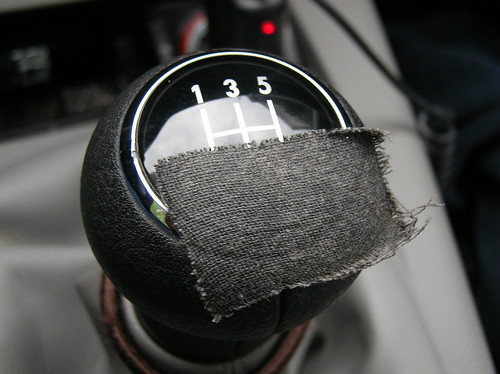
Trim my ass. You have to put your hand on the gear shift knob in order to operate the vehicle, and your lousy "trim" defect is causing wounds. Are you saying you wouldn't replace the steering wheel if a big old rusty nail was sticking out of it?
Do the right thing, Volkswagen.
Stay tuned, readers.
Don't make me do this. Don't make me use the power of my mighty blog against you. I really like the car I bought from you, so I don't want to have to slam you for a bad business practice.
I didn't need a fancy decorative chrome ring around the knob of the gear shift, but you chose to put one there. Recently, the chrome started to peel off. As a result, my spouse and I both got bloody cuts on our hands from the jagged edges where the chrome had peeled or puckered. Finally, I put this ugly piece of hockey tape over it.
The local Volkswagen dealer ordered the replacement part and now tells me it will cost $65 plus labor. They also say that it's not covered by warranty, even though the car is only 2 1/2 years old, because Volkswagen -- you -- considers the top of the gear shift knob to be "trim."

Trim my ass. You have to put your hand on the gear shift knob in order to operate the vehicle, and your lousy "trim" defect is causing wounds. Are you saying you wouldn't replace the steering wheel if a big old rusty nail was sticking out of it?
Do the right thing, Volkswagen.
Stay tuned, readers.
Monday, July 17, 2006
It's good, but not that f*cking good
The Fancy Cafe with the French Name sells this season iced coffee: cold filtered, pre-sweetened with sugar and nutmeg, and then cream added before it's served.
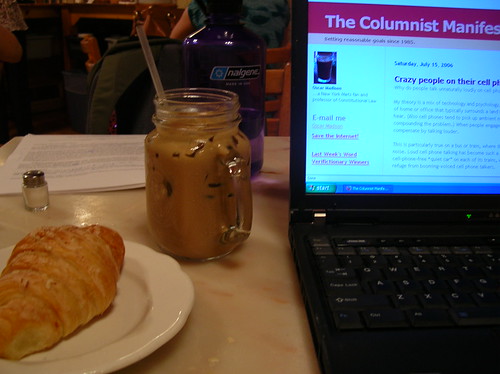
They call it "Magic coffee." Price: $3.50.
Basically, it's like a fancy version of Starbucks' bottled iced coffee that you can get at any gas station mini-mart.

They call it "Magic coffee." Price: $3.50.
Basically, it's like a fancy version of Starbucks' bottled iced coffee that you can get at any gas station mini-mart.
Saturday, July 15, 2006
Crazy people on their cell phones
Why do people talk unnaturally loudly on cell phones?
My theory is a mix of technology and psychology. Out in public, as opposed to the privacy of home or office that typically surrounds a land line, the ambient noise makes it harder to hear. (Also cell phones tend to pick up ambient noise and often have weak reception, compounding the problem.) When people engaged in conversation don’t hear clearly, they compensate by talking louder.
This is particularly true on a bus or train, where the locomotion creates a steady background noise. Loud cell phone talking has become such a problem that Amtrak now designates a cell-phone-free “quiet car” on each of its trains, where non-cell phone users can take refuge from booming-voiced cell phone talkers.
B and I were recently being victimized by such a talker the other day on an Amtrak commuter line. The man had a particularly piercing voice. He was so loud his voice even cut into the language-study CD I was listening to with earphones. I soon found myself unwillingly learning far more about this man’s business than I wanted to know.
Literally his business. He is a supplier of ceramic tiles for new housing construction. He is changing suppliers. He’s not happy with the company that provides the packaging he uses; he can get a much better deal elsewhere. He has hired a former U.S. Senator as a sales rep. He is very boastful, even when trying to sound self deprecating. For instance, he repeatedly pointed out that his profit margin was down, even though his gross revenues were way up.
I’ve often felt that most cell phone conversations that appear to be about business are really about self importance. Any business matter of any real importance is probably going to be confidential and is going to be discussed by someone who is not such an idiot as to allow a dozen random strangers to hear about it. When you overhear somebody on their cell phone talking to the home office – “don’t forget to get that Flenders memo mailed out today!” – or to another roving cell-phone carrying business person – “I’m at the airport... where are you? Oh, you’re at the airport too?” – it’s a conversation that could probably wait until a land line is available.
The longer it went on, Ceramic Tile Man’s conversation seemed increasingly odd to me. I couldn’t quite put my finger on it. I’ve previously speculated that crazy people who talk to themselves on the street now can seem “normal” doing so, as long as they’re holding up a cell phone to their ear. But, because those conversations are rambling monologues with never a pause to listen to a person on the other end, you can usually detect them as imaginary conversations.
Or can you? Larry David on Curb Your Enthusiasm plays a lot of scenes in which you see him on one end of a conversation. He’s told interviewers that he prides himself on playing realistic fake phone calls, inserting realistic pauses and “uh-huh’s” to create the impression of a speaker on the other end of the line. He’s sort of crazy. What’s to say that crazy people on the street – or the train – are not similarly skilled?
Ceramic Tile Man had lots of pauses, as if he were listening. But it finally dawned on me just what was weird. I just couldn’t imagine anybody, let alone another business person, being on the other end of Ceramic Tile Man’s impossibly long, blustering set of statements. It just couldn’t be a real conversation. Ceramic Tile Man is a loud and crazy guy.
My theory is a mix of technology and psychology. Out in public, as opposed to the privacy of home or office that typically surrounds a land line, the ambient noise makes it harder to hear. (Also cell phones tend to pick up ambient noise and often have weak reception, compounding the problem.) When people engaged in conversation don’t hear clearly, they compensate by talking louder.
This is particularly true on a bus or train, where the locomotion creates a steady background noise. Loud cell phone talking has become such a problem that Amtrak now designates a cell-phone-free “quiet car” on each of its trains, where non-cell phone users can take refuge from booming-voiced cell phone talkers.
B and I were recently being victimized by such a talker the other day on an Amtrak commuter line. The man had a particularly piercing voice. He was so loud his voice even cut into the language-study CD I was listening to with earphones. I soon found myself unwillingly learning far more about this man’s business than I wanted to know.
Literally his business. He is a supplier of ceramic tiles for new housing construction. He is changing suppliers. He’s not happy with the company that provides the packaging he uses; he can get a much better deal elsewhere. He has hired a former U.S. Senator as a sales rep. He is very boastful, even when trying to sound self deprecating. For instance, he repeatedly pointed out that his profit margin was down, even though his gross revenues were way up.
I’ve often felt that most cell phone conversations that appear to be about business are really about self importance. Any business matter of any real importance is probably going to be confidential and is going to be discussed by someone who is not such an idiot as to allow a dozen random strangers to hear about it. When you overhear somebody on their cell phone talking to the home office – “don’t forget to get that Flenders memo mailed out today!” – or to another roving cell-phone carrying business person – “I’m at the airport... where are you? Oh, you’re at the airport too?” – it’s a conversation that could probably wait until a land line is available.
The longer it went on, Ceramic Tile Man’s conversation seemed increasingly odd to me. I couldn’t quite put my finger on it. I’ve previously speculated that crazy people who talk to themselves on the street now can seem “normal” doing so, as long as they’re holding up a cell phone to their ear. But, because those conversations are rambling monologues with never a pause to listen to a person on the other end, you can usually detect them as imaginary conversations.
Or can you? Larry David on Curb Your Enthusiasm plays a lot of scenes in which you see him on one end of a conversation. He’s told interviewers that he prides himself on playing realistic fake phone calls, inserting realistic pauses and “uh-huh’s” to create the impression of a speaker on the other end of the line. He’s sort of crazy. What’s to say that crazy people on the street – or the train – are not similarly skilled?
Ceramic Tile Man had lots of pauses, as if he were listening. But it finally dawned on me just what was weird. I just couldn’t imagine anybody, let alone another business person, being on the other end of Ceramic Tile Man’s impossibly long, blustering set of statements. It just couldn’t be a real conversation. Ceramic Tile Man is a loud and crazy guy.
Friday, July 14, 2006
Existential Friday: knowing when it's over
Don't read this post if your life will be somehow diminished by knowing the ending to The Break-Up.
A light, watchable comedy, The Break-Up is also highly missable. Certainly not worth getting stuck in a traffic jam. So when Vince Vaughn and Jennifer Anniston have a chance, post-relationship encounter on the Chicago streets, and begin a desultory conversation, B and I gunned it for the exit of the drive-in.
No one else at the drive-in even started their engines. It's not like they were absorbing the incredible poignance of the scene... they thought, "there has to be another scene if these guys are getting back together."
But since B had already heard from a friend that they don't get back together in the end, this scene was obviously nothing more than a very short denouement. We were on the highway, still listening to the movie soundtrack being broadcast over our car radio, when the tired little scene ended and the closing credits music kicked in.
Sometimes you just know it's over, and you don't need to wait to see the credits to start rolling.
A light, watchable comedy, The Break-Up is also highly missable. Certainly not worth getting stuck in a traffic jam. So when Vince Vaughn and Jennifer Anniston have a chance, post-relationship encounter on the Chicago streets, and begin a desultory conversation, B and I gunned it for the exit of the drive-in.
No one else at the drive-in even started their engines. It's not like they were absorbing the incredible poignance of the scene... they thought, "there has to be another scene if these guys are getting back together."
But since B had already heard from a friend that they don't get back together in the end, this scene was obviously nothing more than a very short denouement. We were on the highway, still listening to the movie soundtrack being broadcast over our car radio, when the tired little scene ended and the closing credits music kicked in.
Sometimes you just know it's over, and you don't need to wait to see the credits to start rolling.
Thursday, July 13, 2006
The Drive-In Movie Theatre Gap
Harper's Magazine used to an amusing feature in which they'd put together incongruous but pointed statistics. Maybe they still do -- I haven't read it in years.
One that I still remember, from the early 1980s, was called "The Drive-In Movie Theatre Gap," listing the 20 nations with the most drive-in theatres. The U.S. topped the list, of course, with something like 2000 drive-ins. Second was Canada, with something like 200. Can you guess which country was third?
It was Australia -- with 30 or so. It makes sense: a successful capitalist economy with large driving distances was likely to have more drive-ins. The Soviet Union actually had drive-in theatres too, apparently, but only a half dozen or so.
Drive-in movies are vanishing from the scene, for reasons that escape me. Maybe movie-goers simply demand better sound than you could get from those clunky drive-in squawk boxes that hooked over your window. Maybe there's some weird thing about the economics of it -- higher overhead relative to indoor theatres. It's not like we've gotten over cars in this country. For whatever reason, our drive-in theatres are vanishing: they are converted into flea markets, or paved over, or just abandoned.
Saratoga Springs has a thriving drive-in theatre, and a couple of weeks ago, B and I took in a first run double feature, Click with Adam Sandler, and The Break-Up, with Vince Vaughn and Jennifer Anniston. The two light, watchable comedies were perfect drive-in fare, but neither of them could top the vintage advertizements for the snack bar that aired for 20 minutes during intermission. Those ads, specially created for drive-in theatres and dating from the 50s, 60s and 70s -- many of them cartoons -- were worth the price of admission by themselves.
Drive-in sound technology has improved: the old speakers are replaced with a radio broadcast that you tune into on your car radio. (And the snack bar offers free jump starts if that happens to kill you battery.)
But a new technical problem is the profusion of SUVs. Parking behind one is like sitting in an indoor theatre behind a really tall guy wearing a hat. Supposedly, the SUVs, minivans and pickup trucks were all supposed to park in the left half of the theatre lot, but that segregation policy wasn't enforced, and we ended up behind a pickup-truck camper shell that blocked out a wide rectangle at the bottom edge of the screen.
Still, it was a great time. The beautiful anticipation of watching coming attraction trailers against a darkening sunset sky can't be matched by indoor theatres. I hope drive-ins make a comeback.
One that I still remember, from the early 1980s, was called "The Drive-In Movie Theatre Gap," listing the 20 nations with the most drive-in theatres. The U.S. topped the list, of course, with something like 2000 drive-ins. Second was Canada, with something like 200. Can you guess which country was third?
It was Australia -- with 30 or so. It makes sense: a successful capitalist economy with large driving distances was likely to have more drive-ins. The Soviet Union actually had drive-in theatres too, apparently, but only a half dozen or so.
Drive-in movies are vanishing from the scene, for reasons that escape me. Maybe movie-goers simply demand better sound than you could get from those clunky drive-in squawk boxes that hooked over your window. Maybe there's some weird thing about the economics of it -- higher overhead relative to indoor theatres. It's not like we've gotten over cars in this country. For whatever reason, our drive-in theatres are vanishing: they are converted into flea markets, or paved over, or just abandoned.
Saratoga Springs has a thriving drive-in theatre, and a couple of weeks ago, B and I took in a first run double feature, Click with Adam Sandler, and The Break-Up, with Vince Vaughn and Jennifer Anniston. The two light, watchable comedies were perfect drive-in fare, but neither of them could top the vintage advertizements for the snack bar that aired for 20 minutes during intermission. Those ads, specially created for drive-in theatres and dating from the 50s, 60s and 70s -- many of them cartoons -- were worth the price of admission by themselves.
Drive-in sound technology has improved: the old speakers are replaced with a radio broadcast that you tune into on your car radio. (And the snack bar offers free jump starts if that happens to kill you battery.)
But a new technical problem is the profusion of SUVs. Parking behind one is like sitting in an indoor theatre behind a really tall guy wearing a hat. Supposedly, the SUVs, minivans and pickup trucks were all supposed to park in the left half of the theatre lot, but that segregation policy wasn't enforced, and we ended up behind a pickup-truck camper shell that blocked out a wide rectangle at the bottom edge of the screen.
Still, it was a great time. The beautiful anticipation of watching coming attraction trailers against a darkening sunset sky can't be matched by indoor theatres. I hope drive-ins make a comeback.
Wednesday, July 12, 2006
If you love a song, sometimes you just have to let it go
The cafe where I ate lunch today was playing a CD of a female jazz vocalist performing a "jazz" version of Bob Dylan's You're Gonna Make Me Lonesome When You Go. She sang it in the same smooth, down tempo, low energy way she sang the jazz standards that filled up the rest of the album.
I suppose that musicians who do a cover of a song probably really like the song and usually intend their interpretation to be a tribute to the original. There are many fine pop covers that are, in their own way, as good or even better than the original, and many cover artists who can really get to the heart of someone else's song.
Then there's this thing. The singer had a rich voice to be sure, but many songs just don't lend themselves to jazz reinterpretations. I suspect most Bob Dylan songs are in this category; certainly this one is. The cover sounded like a big, steamy pile of poop.
I would like to identify by name the vocalist who made Dylan's hard edged love song sound so sappy. But then I'd have to do research which would require me listening to her again, and I'm mad at her.
Dylan's gravelly tuneless singing voice fools many people into thinking he was a "bad" singer, but he had a way of putting his songs across that's hard to top. Jazz singers, who by profession are generally not songwriters and whose repertoires consist mostly or entirely of cover songs, tend to think they are consumate song-stylists. But they have to realize that many of their songs are a short step away from elevator music. If they're not careful, they can take a tune that has pace and tension and deceptive simplicity, and just let all the air out of it.
I suppose that musicians who do a cover of a song probably really like the song and usually intend their interpretation to be a tribute to the original. There are many fine pop covers that are, in their own way, as good or even better than the original, and many cover artists who can really get to the heart of someone else's song.
Then there's this thing. The singer had a rich voice to be sure, but many songs just don't lend themselves to jazz reinterpretations. I suspect most Bob Dylan songs are in this category; certainly this one is. The cover sounded like a big, steamy pile of poop.
I would like to identify by name the vocalist who made Dylan's hard edged love song sound so sappy. But then I'd have to do research which would require me listening to her again, and I'm mad at her.
Dylan's gravelly tuneless singing voice fools many people into thinking he was a "bad" singer, but he had a way of putting his songs across that's hard to top. Jazz singers, who by profession are generally not songwriters and whose repertoires consist mostly or entirely of cover songs, tend to think they are consumate song-stylists. But they have to realize that many of their songs are a short step away from elevator music. If they're not careful, they can take a tune that has pace and tension and deceptive simplicity, and just let all the air out of it.
Tuesday, July 11, 2006
Iced coffee wars: just a border skirmish
I saw these posters in Dunkin' Donuts yesterday, while buying iced coffee.
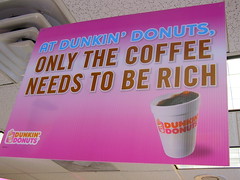
They're unmistakable potshots at Starbucks, but when understood in the broader context of the Iced Coffee War, they are not an attempted invasion of Starbucks territory. Rather than trying to raid the higher end Starbucks customers, these sarcastic slogans are plainly designed by Dunkin Donuts to build up an esprit de corps among its existing customers at the lower half of the coffee market. Dunkin is just firing a warning shot to protect its border. (Was it necessary? I don't see any major danger of Starbucks lowering its prices or developing a massive donut selection.)
Since the conflict has expanded beyond iced coffee to include hot coffee and breakfast sandwiches, the name "Iced Coffee War" has become a misnomer. But it's catchy, and it accurately describes my first experience of the war, so it's a keeper. Sometimes you just have to accept a misnamed war, like "the War of Spanish Succession."
If you find any of this confusing, here is a map graphically depicting the conflict so far.
I forgot my damned cell phone!
Okay, it's official: I'm now fully dependent on having a cell phone with me. I forgot mine on this trip to a Major Metropolitan Area, and it's quite the pain in the ass. The $7.50 hotel charge for the long distance call to B's cell phone, that would have been free from my my cell phone, is just the tip of the iceberg.
Back when I practiced law, I remember how at the courthouse the lawyers and other folks would rush for the pay phones whenever there was a break in the courtroom action. Lots of impatient foot tapping while waiting for a free phone, and the like.
Today, I'm observing a civil rights trial in a busy federal courthouse in a major metropolis. At the lunch break, I needed to use the phone, and was directed by a U.S. marshal to the one forlorn pay phone in the entire building.
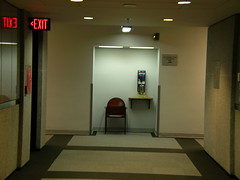
The good news: since everyone else had their cell phones, the pay phone was not in use.
Back when I practiced law, I remember how at the courthouse the lawyers and other folks would rush for the pay phones whenever there was a break in the courtroom action. Lots of impatient foot tapping while waiting for a free phone, and the like.
Today, I'm observing a civil rights trial in a busy federal courthouse in a major metropolis. At the lunch break, I needed to use the phone, and was directed by a U.S. marshal to the one forlorn pay phone in the entire building.

The good news: since everyone else had their cell phones, the pay phone was not in use.
Monday, July 10, 2006
Counter-offensive
Starbucks escalates into full breakfast war with assault on Egg McMuffin
Starbucks has opened a new front in its growing war with McDonald’s, exploding the once-contained iced coffee dispute into a major breakfast conflict. Starbucks has unleashed a new line of EggMcMuffinesque breakfast sandwiches. "Let the day begin!" the Starbucks ad exclaims, euphemistically. By "day" they obviously mean "smackdown" or "ordeal of total war."
Apparently, neither corporation is fully satisfied with its place in the breakfast world – Starbucks as an upper half of the market coffee-and-pastry retailer, McDonald’s as a 3-meal-a-day (incl. breakfast) low-end junk food purveyor. McDonald's doesn't want Egg McMuffin customers to nip over to Starbucks for coffee, and now offer what they call "premium" hot coffee. Starbucks wants to cut into the fast-food "full" breakfast trade, by offering breakfast meat 'n' eggs in addition to their former menu of breakfast pastries.
Like all wars that spin out of control, a certain loss of sanity may be at work here. Is there really that much overlap between the customer bases? Does one company think it can make major inroads into the others' patrons? Or is Starbucks simply retaliating for McDonalds' coffee upgrade?
Hard to say. Starbucks breakfast sandwiches are priced just a few dimes higher than the competitors' (not just McDonald's, but also Dunkin' Donuts and the other fast food joints), while offering much more high falutin' ingredients. "Black forest ham" in one sandwich, "eggs florentine" (!) in another.
To make a more apples-to-apples comparison between Starbucks and McDonald's, I order the "peppered bacon and egg" sandwich, a scrambled-egg, cheddar cheese and bacon affair on an English muffin. It's a tad less greasy, a tad more flavorful, especially with the pepper. But at the end of the day, all these breakfast sandwiches taste like airplane food. Mass produced scrambled eggs, reheated in microwaves or convection ovens, will always be rubbery; and the English muffin will always be chewy rather than crsiply toasted. For all its supposed class, Starbucks can't lick these technological cooking problems.
Iced coffee war update
Meanwhile, on the iced coffee war front... McDonald's may have launched a briefly successful blitzkreig (oops! Nazi analogy!) for my business as an iced coffee consumer, but I now think that it is not equipped for success in a longer term war for Starbucks customers.
Apparently, the McDonald's thrust is what military analysts would call a "reconnaissance in force." It's just another in a long line of McDonald's experiments with new menu items. In fact, this one appears to be regional. I've checked out a number of McDonald's restaurants back in the midwest -- no iced coffee.
What's more, my return visit for the McDonald's iced coffee while I was still back east proved rather disappointing. A long wait, an order screwup, and ultimately, it didn't taste nearly as good as it did the first time.
The problem with McDonald's and high end coffee service is that it's retail model is too dependent on the lowest-common-denominator production line. Everything is set up so that it's workers can function as de-skilled automata.
But up-market coffee menus involve too many variables for automation. Recall that Burger King has long exploited this aspect of McDonald's with hamburger service -- McDonald's bread-and-butter, if you will -- with it's "have it your way" theme, offering made-to-order departures from the standard sandwich makeup. McDonald's has always struggled with customer requests for variation.
Coffee is all about that. People take their coffee too many different ways. With or without sugar, cream or black or milk, whole or skim, or soy milk for that matter. And we haven't even gotten to cocoa powder, cinnamon, etc. McDonald's simply can't handle that many choices on a beverage that's so tangential to its core menu mission -- large, medium and small is about it's limit. (On my second visit, for instance, they gave me cream and sugar, when I asked for cream, no sugar.) Starbucks, with its dedicated coffee menu, can production-line all this variation.
While Starbucks can let their customers add their own cream and sugar, to taste, the fast food chains apparently need to control the cream and sugar outlay. They add it for you, I assume, as a cost-containment measure. This strikes me as an insuperable barrier to McDonald's making a serious inroad into the upper-half coffee market, because those customers really want to add their own. Dunkin Donuts, like McDonalds, has their counter employees add the cream and sugar, but they haven't demonstrated any pretensions to the upper-half market.
Meanwhile, on another front...
Starbucks has opened a new front in its growing war with McDonald’s, exploding the once-contained iced coffee dispute into a major breakfast conflict. Starbucks has unleashed a new line of EggMcMuffinesque breakfast sandwiches. "Let the day begin!" the Starbucks ad exclaims, euphemistically. By "day" they obviously mean "smackdown" or "ordeal of total war."
Apparently, neither corporation is fully satisfied with its place in the breakfast world – Starbucks as an upper half of the market coffee-and-pastry retailer, McDonald’s as a 3-meal-a-day (incl. breakfast) low-end junk food purveyor. McDonald's doesn't want Egg McMuffin customers to nip over to Starbucks for coffee, and now offer what they call "premium" hot coffee. Starbucks wants to cut into the fast-food "full" breakfast trade, by offering breakfast meat 'n' eggs in addition to their former menu of breakfast pastries.
Like all wars that spin out of control, a certain loss of sanity may be at work here. Is there really that much overlap between the customer bases? Does one company think it can make major inroads into the others' patrons? Or is Starbucks simply retaliating for McDonalds' coffee upgrade?
Hard to say. Starbucks breakfast sandwiches are priced just a few dimes higher than the competitors' (not just McDonald's, but also Dunkin' Donuts and the other fast food joints), while offering much more high falutin' ingredients. "Black forest ham" in one sandwich, "eggs florentine" (!) in another.
To make a more apples-to-apples comparison between Starbucks and McDonald's, I order the "peppered bacon and egg" sandwich, a scrambled-egg, cheddar cheese and bacon affair on an English muffin. It's a tad less greasy, a tad more flavorful, especially with the pepper. But at the end of the day, all these breakfast sandwiches taste like airplane food. Mass produced scrambled eggs, reheated in microwaves or convection ovens, will always be rubbery; and the English muffin will always be chewy rather than crsiply toasted. For all its supposed class, Starbucks can't lick these technological cooking problems.
Just an Egg McMuffin in a fancy bag? The taped package looks like something from an expensive gift shop, bearing the message: "epiphanies rarely happen over plain toast." Has the word "epiphany" ever been uttered in a McDonald's?
Iced coffee war update
Meanwhile, on the iced coffee war front... McDonald's may have launched a briefly successful blitzkreig (oops! Nazi analogy!) for my business as an iced coffee consumer, but I now think that it is not equipped for success in a longer term war for Starbucks customers.
Apparently, the McDonald's thrust is what military analysts would call a "reconnaissance in force." It's just another in a long line of McDonald's experiments with new menu items. In fact, this one appears to be regional. I've checked out a number of McDonald's restaurants back in the midwest -- no iced coffee.
What's more, my return visit for the McDonald's iced coffee while I was still back east proved rather disappointing. A long wait, an order screwup, and ultimately, it didn't taste nearly as good as it did the first time.
The problem with McDonald's and high end coffee service is that it's retail model is too dependent on the lowest-common-denominator production line. Everything is set up so that it's workers can function as de-skilled automata.
But up-market coffee menus involve too many variables for automation. Recall that Burger King has long exploited this aspect of McDonald's with hamburger service -- McDonald's bread-and-butter, if you will -- with it's "have it your way" theme, offering made-to-order departures from the standard sandwich makeup. McDonald's has always struggled with customer requests for variation.
Coffee is all about that. People take their coffee too many different ways. With or without sugar, cream or black or milk, whole or skim, or soy milk for that matter. And we haven't even gotten to cocoa powder, cinnamon, etc. McDonald's simply can't handle that many choices on a beverage that's so tangential to its core menu mission -- large, medium and small is about it's limit. (On my second visit, for instance, they gave me cream and sugar, when I asked for cream, no sugar.) Starbucks, with its dedicated coffee menu, can production-line all this variation.
While Starbucks can let their customers add their own cream and sugar, to taste, the fast food chains apparently need to control the cream and sugar outlay. They add it for you, I assume, as a cost-containment measure. This strikes me as an insuperable barrier to McDonald's making a serious inroad into the upper-half coffee market, because those customers really want to add their own. Dunkin Donuts, like McDonalds, has their counter employees add the cream and sugar, but they haven't demonstrated any pretensions to the upper-half market.
Meanwhile, on another front...
In its ongoing war on American health, McDonald's steps up its propaganda
campaign: "hey! We're into exercise!"
campaign: "hey! We're into exercise!"
As an observer of the war, I try to maintain neutrality.
Sunday, July 09, 2006
Running for mayor
[Western Massachusetts, June 26-28, 2006]
My friends Lynn and Abigail live in a small town in the eastern foothills of the Berkshires, in Massachusetts. It's one of those towns where everybody knows everybody else. There are only a couple of restaurants in town, so you're almost automatically a regular just by living there. And with the premium on keeping good relations with the neighbors, you can't go into a restaurant and say, in a loud voice, "don't get the asparagus omelette -- it's going to be canned asparagus!"
Lynn and Abigail had an out-of-town guest who said just this in the local restaurant. A guest who said this and then closely examined the waitress about other menu items. When they were alone after this incident, Abigail said to Lynn, "you know we're just going to have to go back there as soon as we can and apologize."
That's what it's like in small towns, as well as smallish cities like mine, and even in big cities at your own version of Cheers bar, where everybody knows your name. Doesn't it suck when your visitors blow into town and screw it up for you?
I've come up with a phrase to describe the situation when you flip the bird at people who turn out to be your near-neighbors whom you will no doubt encounter again. I call it, ironically, "running for mayor."
"Running for mayor" doesn't necessarily mean you're being impolite. Sometimes you may be in the right, like when you scream out the window "HEY! there's people trying to sleep!" at your backyard-adjoining neighbors who have just launched a major barrage of bottle rockets along the fence line at 12:30 a.m. on July 2 in early anticipation of the Fourth of July. I'm just saying, you don't necessarily pick up the votes that way.
The phrase can be used in the non-ironic sense, when you're trying to guide the behavior ofl your out-of-town friends when you take them to your local hangout. "I need you to try to act like you're running for mayor."
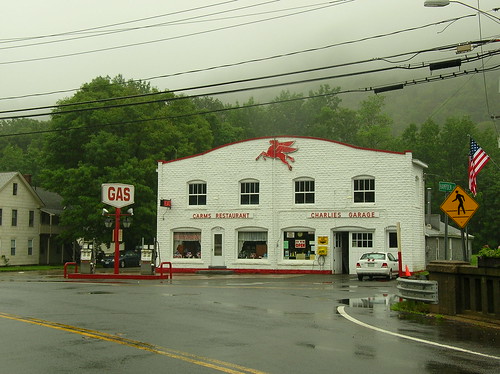
Above and below: "Gas ... Eat" -- Carm's Restaurant, Chester Massachusetts.
My friends Lynn and Abigail live in a small town in the eastern foothills of the Berkshires, in Massachusetts. It's one of those towns where everybody knows everybody else. There are only a couple of restaurants in town, so you're almost automatically a regular just by living there. And with the premium on keeping good relations with the neighbors, you can't go into a restaurant and say, in a loud voice, "don't get the asparagus omelette -- it's going to be canned asparagus!"
Lynn and Abigail had an out-of-town guest who said just this in the local restaurant. A guest who said this and then closely examined the waitress about other menu items. When they were alone after this incident, Abigail said to Lynn, "you know we're just going to have to go back there as soon as we can and apologize."

That's what it's like in small towns, as well as smallish cities like mine, and even in big cities at your own version of Cheers bar, where everybody knows your name. Doesn't it suck when your visitors blow into town and screw it up for you?
I've come up with a phrase to describe the situation when you flip the bird at people who turn out to be your near-neighbors whom you will no doubt encounter again. I call it, ironically, "running for mayor."
"Running for mayor" doesn't necessarily mean you're being impolite. Sometimes you may be in the right, like when you scream out the window "HEY! there's people trying to sleep!" at your backyard-adjoining neighbors who have just launched a major barrage of bottle rockets along the fence line at 12:30 a.m. on July 2 in early anticipation of the Fourth of July. I'm just saying, you don't necessarily pick up the votes that way.
The phrase can be used in the non-ironic sense, when you're trying to guide the behavior ofl your out-of-town friends when you take them to your local hangout. "I need you to try to act like you're running for mayor."

Above and below: "Gas ... Eat" -- Carm's Restaurant, Chester Massachusetts.

Saturday, July 08, 2006
Prime suspect
How to make yourself a prime suspect, in 2 easy steps:
1) Travel in a group known as a "murder."
2) Linger suspiciously at crime scenes.

1) Travel in a group known as a "murder."
2) Linger suspiciously at crime scenes.

Friday, July 07, 2006
Existential Friday: End of Part One
B and I recently watched the two-DVD set of No Direction Home, Scorcese's documentary of Bob Dylan's transformation from folk to rock singer.
Old news -- the film has long been moved out of the "new releases" section of the video store. And if you're a Bob Dylan maven, pretty much everything in it is apparently old news.
For me -- a Bob Dylan fan but not a maven -- it's fascinating. I love the images of Greenwich Village circa 1960, the back-story of the music industry as it transitioned from popular 1950s crooners into (ultimately) Rock, the original footage of both live and studio performances by Dylan, home movies of Hibbing, Minnesota, and great interviews with era musicians.
Most of all, I love the interview footage with Dylan himself, which I'd never seen anywhere. You're tempted to say, looking at this wrinkled 60-something imp with the graying mop of curly hair, that he's wasted, a shadow of his former self. And yet he's his old self. I mean, isn't his former self a shadow?
I'm totally on board with the idea that Dylan is, or was, a genuis. To me, he had a genius for words that are shallow and deep at the same time. He would purposely strive for the resonant phrase that is vague enough to be meaningful to everybody, and then laugh at you for finding meaning in it. The most repetitive theme in a lifetime of interviews is him "debunking" interpretations of his lyrics (or, analogously, of his choice of the name "Dylan").
The shallow/deep character, to me, goes a long way toward explaining how a song like Blowin in the Wind can be the most exquisitely meaningful folk song in the world in 1963 and an unplayable cliche less than 10 years later.
What I find endlessly fascinating is the compressed time span for popular music since Dylan hit the scene. Five years is a small fraction of a life -- how much has changed in the past five years of your life? -- yet it's an age in music. Musicians can go from #1 hit to game show host in five years. In the five year span from 1961-66, Dylan goes from his first album, when he records not one original song and indeed has only even written a couple of songs, to accoustic folk icon, to newly-minted electric rock star. It's a whole career.
Though Dylan's career was longer than most popular musicians -- a 13 year run, if you take Blood on the Tracks (1974) to be his last great album -- his star was never higher than when he performed Blowin in the Wind at the Newport Folk Festival in 1963.
The Newport Folk festival marks the "end of part I" of the two-part, two-DVD movie. Arguably, it was the "end of part I" -- the accoustic part -- of Dylan's career. He was 22.
How many parts are there in a life? Just two? I'm pretty sure my part I ended a few years ago. What about yours?
Old news -- the film has long been moved out of the "new releases" section of the video store. And if you're a Bob Dylan maven, pretty much everything in it is apparently old news.
For me -- a Bob Dylan fan but not a maven -- it's fascinating. I love the images of Greenwich Village circa 1960, the back-story of the music industry as it transitioned from popular 1950s crooners into (ultimately) Rock, the original footage of both live and studio performances by Dylan, home movies of Hibbing, Minnesota, and great interviews with era musicians.
Most of all, I love the interview footage with Dylan himself, which I'd never seen anywhere. You're tempted to say, looking at this wrinkled 60-something imp with the graying mop of curly hair, that he's wasted, a shadow of his former self. And yet he's his old self. I mean, isn't his former self a shadow?
I'm totally on board with the idea that Dylan is, or was, a genuis. To me, he had a genius for words that are shallow and deep at the same time. He would purposely strive for the resonant phrase that is vague enough to be meaningful to everybody, and then laugh at you for finding meaning in it. The most repetitive theme in a lifetime of interviews is him "debunking" interpretations of his lyrics (or, analogously, of his choice of the name "Dylan").
The shallow/deep character, to me, goes a long way toward explaining how a song like Blowin in the Wind can be the most exquisitely meaningful folk song in the world in 1963 and an unplayable cliche less than 10 years later.
What I find endlessly fascinating is the compressed time span for popular music since Dylan hit the scene. Five years is a small fraction of a life -- how much has changed in the past five years of your life? -- yet it's an age in music. Musicians can go from #1 hit to game show host in five years. In the five year span from 1961-66, Dylan goes from his first album, when he records not one original song and indeed has only even written a couple of songs, to accoustic folk icon, to newly-minted electric rock star. It's a whole career.
Though Dylan's career was longer than most popular musicians -- a 13 year run, if you take Blood on the Tracks (1974) to be his last great album -- his star was never higher than when he performed Blowin in the Wind at the Newport Folk Festival in 1963.
The Newport Folk festival marks the "end of part I" of the two-part, two-DVD movie. Arguably, it was the "end of part I" -- the accoustic part -- of Dylan's career. He was 22.
How many parts are there in a life? Just two? I'm pretty sure my part I ended a few years ago. What about yours?
Thursday, July 06, 2006
The cheap seats -- July 4, 2006
Every year, the people of my neighborhood, gather in a little park on July 4 to watch the firework show put on by the town across the lake.
It's like the scene in Titanic, where you see the ship shooting off distress signal flares that look tiny above the vast expanse of sea. Only more festive.
It's like the scene in Titanic, where you see the ship shooting off distress signal flares that look tiny above the vast expanse of sea. Only more festive.
More about gardening

I've been really pleased about how pretty our garden is looking. It turns out, though, that these purple flowers are weeds.

Wednesday, July 05, 2006
Gimme an "E"!
Is Carly Simon's You're So Vain still (or was it ever) the anthem for women disgruntled by self-centered crush object?
For me, it's just an earworm, one that will always pop up when I go up to Saratoga or watch a solar eclipse. (I did think it was funny to see Kate Hudson and Matthew McConaughey sing it in the mostly unwatchable How to Lose a Guy in Ten Days, but that's not a tribute to the song.)
The identity of the unnamed subject of You're So Vain is apparently a mystery. Neel refers us to an informative Wikipedia article which explains that the vain, Saratoga-goin', Lear-jet-flyin', apricot-scarf-wearin' mystery man is not Mick Jagger but does have an "e" in his name.
All I can say is: Carly, don't wait too long to reveal the secret, lest the handful of middle-aged people who still even give a hoot grow old and forget they once cared.
The identity of Vain Man could be the pilot for a series of a cable station time-filler shows called "Less-than-Compelling Mysteries" -- lingering secrets about matters that are either very trivial (Simon's song) or where everyone's educated guess is actually correct (who exposed Valerie Plame to the press?).
A couple of theories about "Who's So Vain."
1) It's Carly Simon herself. Check out the prominent nipples in her album cover photo. She's very vain.
2) My real name is Not Oscar Madison. It has an "e."
3) "Neel Mehta" has three "e"s.
4) Wikipedia states that "he" is not Mick Jagger, who actually sings back-up on the song. I always thought that sounded like Jagger back there, but then I thought that can't be him singing backup about how he himself is so vain. Yes it could: he's that vain.
For me, it's just an earworm, one that will always pop up when I go up to Saratoga or watch a solar eclipse. (I did think it was funny to see Kate Hudson and Matthew McConaughey sing it in the mostly unwatchable How to Lose a Guy in Ten Days, but that's not a tribute to the song.)
The identity of the unnamed subject of You're So Vain is apparently a mystery. Neel refers us to an informative Wikipedia article which explains that the vain, Saratoga-goin', Lear-jet-flyin', apricot-scarf-wearin' mystery man is not Mick Jagger but does have an "e" in his name.
All I can say is: Carly, don't wait too long to reveal the secret, lest the handful of middle-aged people who still even give a hoot grow old and forget they once cared.
The identity of Vain Man could be the pilot for a series of a cable station time-filler shows called "Less-than-Compelling Mysteries" -- lingering secrets about matters that are either very trivial (Simon's song) or where everyone's educated guess is actually correct (who exposed Valerie Plame to the press?).
A couple of theories about "Who's So Vain."
1) It's Carly Simon herself. Check out the prominent nipples in her album cover photo. She's very vain.
2) My real name is Not Oscar Madison. It has an "e."
3) "Neel Mehta" has three "e"s.
4) Wikipedia states that "he" is not Mick Jagger, who actually sings back-up on the song. I always thought that sounded like Jagger back there, but then I thought that can't be him singing backup about how he himself is so vain. Yes it could: he's that vain.
Tuesday, July 04, 2006
Fourth of July -- Main Street, USA
Saratoga Springs, New York -- June 25, 2006
What is it about "Main Street" in a small American town, it's grand Victorian-era buildings draped in bunting, that says "it's the Fourth of July in the good old U.S. of A"? This image is such an ingrained cliche that Walt Disney, the master of the obviousl-evocative image, turned it into the entry-walkway-cum-shopping-mall of his theme parks.
Maybe it's because so many of these Main Streets, in Anytown, USA, were built around 1876, when our nation celebrated its Centennial. I have the distinct (though vaguely informed) impression the Centennial celebration was grand.
Today is the 230th anniversary of Declaration of Independence, which also happens to be the 30th anniversary of the Bicentennial celebration. You may recall what an incredible dud that was. Except for the "tall ships" sailing into a couple of east coast ports, the celebration wasn't worthy of a great nation. (It was a good deal less than the excitement over the more-or-less meaningless millenium, for example.)
In Washington, D.C., our nation's capital for god's sake, the splashiest bicentennial attraction was the ill-conceived idea of gutting DC's Union Station and converting it into a huge standing-only theatre for the screening of a cheesy 15-minute film. The conversion was (fittingly perhpas) over budget and behind schedule, and right after the Bicentennial, the decisionmakers thought better of it, dismantled the theatre, and launched the 12-year construction project that converted Union Station into the well-appointed transportation hub it is today.
1976 was not a fortuitous year for a national celebration. At the tail end of the Vietnam and Watergate eras, in the midst of the energy crisis and the great fiscal crisis of our major cities, on the eve of disco, it was something of a low point in national self esteem. It was certainly a time when public works projects were heavily stinted. Thus, as a matter of available fisc and public taste, the Bicentennial could hardly help being cheesy.
I hope that our nation has a fitting celebration of its Tricentennial. I hope that in 2076 it is proud and free, that it has led the world in solving the now-looming environmental crisis, and that its democratic institutions have spread elsewhere in the world by example rather than by force. Meanwhile, here are some nice pictures on and around Main Street -- actually Broadway -- in Saratoga Springs.
They should bottle that stuff. Saratoga's hot springs are free to the public via several drinking fountains in Congress Park. Salty, but interesting.
What is it about "Main Street" in a small American town, it's grand Victorian-era buildings draped in bunting, that says "it's the Fourth of July in the good old U.S. of A"? This image is such an ingrained cliche that Walt Disney, the master of the obviousl-evocative image, turned it into the entry-walkway-cum-shopping-mall of his theme parks.
Maybe it's because so many of these Main Streets, in Anytown, USA, were built around 1876, when our nation celebrated its Centennial. I have the distinct (though vaguely informed) impression the Centennial celebration was grand.
Today is the 230th anniversary of Declaration of Independence, which also happens to be the 30th anniversary of the Bicentennial celebration. You may recall what an incredible dud that was. Except for the "tall ships" sailing into a couple of east coast ports, the celebration wasn't worthy of a great nation. (It was a good deal less than the excitement over the more-or-less meaningless millenium, for example.)
In Washington, D.C., our nation's capital for god's sake, the splashiest bicentennial attraction was the ill-conceived idea of gutting DC's Union Station and converting it into a huge standing-only theatre for the screening of a cheesy 15-minute film. The conversion was (fittingly perhpas) over budget and behind schedule, and right after the Bicentennial, the decisionmakers thought better of it, dismantled the theatre, and launched the 12-year construction project that converted Union Station into the well-appointed transportation hub it is today.
1976 was not a fortuitous year for a national celebration. At the tail end of the Vietnam and Watergate eras, in the midst of the energy crisis and the great fiscal crisis of our major cities, on the eve of disco, it was something of a low point in national self esteem. It was certainly a time when public works projects were heavily stinted. Thus, as a matter of available fisc and public taste, the Bicentennial could hardly help being cheesy.
I hope that our nation has a fitting celebration of its Tricentennial. I hope that in 2076 it is proud and free, that it has led the world in solving the now-looming environmental crisis, and that its democratic institutions have spread elsewhere in the world by example rather than by force. Meanwhile, here are some nice pictures on and around Main Street -- actually Broadway -- in Saratoga Springs.
Above: patriotic bunting, Broadway, Saratoga Springs. Below: Victorian storefronts.
Above: City Hall. Below: The Algonquin.
What could be more patriotic than small town law practice? Left: "Robert L. Katzman,
Attorney at Law." Right: Chambers of the county judge, Frank B. Williams --
two windows right of the flag, one storey above the toy store "G. Willikers."
Attorney at Law." Right: Chambers of the county judge, Frank B. Williams --
two windows right of the flag, one storey above the toy store "G. Willikers."
They should bottle that stuff. Saratoga's hot springs are free to the public via several drinking fountains in Congress Park. Salty, but interesting.
Monday, July 03, 2006
Sweet rental rides
My mildly horrendous train trip from Chicago to Albany ended with the inconvenient fillip of a transfer -- via $30 cab ride -- from the Amtrak station to the airport to pick up our rental car.
The car rental is usually the last travel hassle you have to go through after a wearing trip. You negotiate the rental car desk, which is just as fun as the airline check-in desk, and designed to look exactly the same: frustrated patrons leaning forward, legs crossed, and folded arms resting on the chest-high counter while the customer-weary counter clerk tappity-tappity-taps on a computer keyboard.
With age, I've gotten pickier about rental cars. The American-made cars they offer really suck: Chevy Malibu, Pontiac Grand Am. I always wind up at the rental desk trying to negotiate a better car, often unsuccessfully, and I was preparing myself to swallow the bitter pill of a week in a Ford Taurus -- a fitting end to a disappointing journey. But a pleasant surprise awaited me.
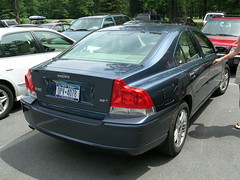
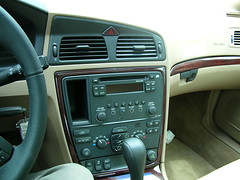
Volvo S60. Mmmmmm.
This was my second really good rental experience in a row. In Vancouver, we were able to substitute a Toyota Matrix for the Ford Taurus. Technically a downgrade, and therefore a cut in price, the Matrix was also a smooth ride. It was comfortable, decently powered, and had two features I really liked.
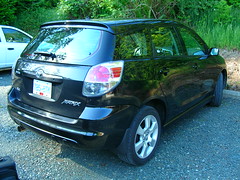
Toyota Matrix.
One was the "old knees" feature. You may know that a lot of older people are drawn to minivans and SUVs, not because they want big-butt vehicles, but simply because the higher chassis enables riders to get in and out of the seats without doing deep knee bends. Well the Matrix offers high seats in a normal sedan-sized station wagon. I don't know whether this means the car is dangerously high-centered like SUVs -- I hope not. I like the idea of a high-seated alternative.
Second, the Matrix offers what I call the "ABSD" -- or "Anti-Back-Seat-Driver" -- feature. Technically, the design deters annoying kibbitzing from the passenger seat by making it impossible for the front-seat passenger to see any of the dashboard dials.

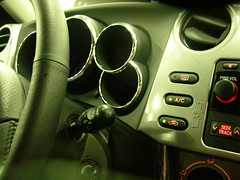
Toyota Matrix ABSD dashboard indicators, front and side views.
Neat, huh?
The car rental is usually the last travel hassle you have to go through after a wearing trip. You negotiate the rental car desk, which is just as fun as the airline check-in desk, and designed to look exactly the same: frustrated patrons leaning forward, legs crossed, and folded arms resting on the chest-high counter while the customer-weary counter clerk tappity-tappity-taps on a computer keyboard.
With age, I've gotten pickier about rental cars. The American-made cars they offer really suck: Chevy Malibu, Pontiac Grand Am. I always wind up at the rental desk trying to negotiate a better car, often unsuccessfully, and I was preparing myself to swallow the bitter pill of a week in a Ford Taurus -- a fitting end to a disappointing journey. But a pleasant surprise awaited me.
"We're giving you a free upgrade," said the Hertz counter clerk. "Would you like a pickup truck or a Volvo S60?"The Volvo S60 is for all intents and purposes a luxury car. Not top of the line, perhaps, but a sweet ride. Roomy, ergonomically designed interiors, buttery leather seats the color of ... well, butter, actually. Nice power and handling. Definitely a car that makes you feel a tad cramped and dissatisfied when you get back into your own car after the trip.
"Okay..." I eyed her suspiciously. What was the catch? "I'll take the Volvo."
"Would you like a blue one or a silver one?"


Volvo S60. Mmmmmm.
This was my second really good rental experience in a row. In Vancouver, we were able to substitute a Toyota Matrix for the Ford Taurus. Technically a downgrade, and therefore a cut in price, the Matrix was also a smooth ride. It was comfortable, decently powered, and had two features I really liked.

Toyota Matrix.
One was the "old knees" feature. You may know that a lot of older people are drawn to minivans and SUVs, not because they want big-butt vehicles, but simply because the higher chassis enables riders to get in and out of the seats without doing deep knee bends. Well the Matrix offers high seats in a normal sedan-sized station wagon. I don't know whether this means the car is dangerously high-centered like SUVs -- I hope not. I like the idea of a high-seated alternative.
Second, the Matrix offers what I call the "ABSD" -- or "Anti-Back-Seat-Driver" -- feature. Technically, the design deters annoying kibbitzing from the passenger seat by making it impossible for the front-seat passenger to see any of the dashboard dials.


Toyota Matrix ABSD dashboard indicators, front and side views.
Neat, huh?
Sunday, July 02, 2006
Sometimes trash is really just trash
Our Town has a thriving culture of what it calls "trash picking." This sounds like, but decidedly is not, rooting through garbage cans, which would be sad and yucky, but rather a social contract in which potentially reusable items are put out on the curb with the trash in an implicit offer to the public: "help yourself" to anything you may find useful. Almost invariably, any such item gets snapped up hours before the trash pickup crew arrives the next morning.
Some of my friends make a hobby out of trash picking. They will dine out for years on stories of how they trash-picked a picnic table, a perfectly decent bike, a pair of great old cross country skis.
Moral Turpitude is furnishing her new solo practice law office these days. Clearly, she is doing what she can to keep her overhead down, but I would really like to steer her away from picking up this sort of thing.
Some of my friends make a hobby out of trash picking. They will dine out for years on stories of how they trash-picked a picnic table, a perfectly decent bike, a pair of great old cross country skis.
Moral Turpitude is furnishing her new solo practice law office these days. Clearly, she is doing what she can to keep her overhead down, but I would really like to steer her away from picking up this sort of thing.

And now, back to our regular programming
I try to avoid "meta" blog posts talking about the style of the blog, but I can't help but notice how verbose I've been recently on the pages of CM. Long, rambling posts and humor that, if it's there at all, can be spotted from so far off that by the time the punch line arrives one feels only boredom. And sentences like that last one.
Maybe the frustration of not being able to blog every day while traveling has skewed my style. Maybe I'll get back to my pithy, funny self now that I'm home.
But what if this blog depression is more chronic than I thought? What if my funny is just gone?
:(
Good god! Did I just use an emoticon?!
Maybe the frustration of not being able to blog every day while traveling has skewed my style. Maybe I'll get back to my pithy, funny self now that I'm home.
But what if this blog depression is more chronic than I thought? What if my funny is just gone?
:(
Good god! Did I just use an emoticon?!
Saturday, July 01, 2006
I {heart} you, Southwest Airlines!
Yesterday was a day of candy machine karma. 
What is "candy machine karma"? A few days earlier at our hotel in Saratoga, seized by a late night chocolate craving, I hunted down a candy machine after making a floor-to-floor vending machine search. The least objectionable of its pathetic selection was a king-size Snickers for $1.25. The machine slurped up my first dollar but refused to take in my second dollar, while spitting back the first. After about six tries, and remembering that insanity is sometimes defined as trying the same thing repeatedly and expecting a different outcome, I gave up.
Which was just as well. How could consuming a 3.7 ounce, 510 calorie vending machine candy bar at midnight possibly be a good idea, especially from the vantage point of the next morning? Thus candy machine karma: sometimes the universe conspires to prevent you from getting what you want, and you're better off.
Well, yesterday at 3:30, B and I showed up at the Albany-Rensselaer Amtrak station to catch the overnight train back to Chicago. I had managed to put the outbound Chicago-Albany trip behind me, and true to my positive-outlook, was looking forward to a much more enjoyable return trip. (Note definition of "insanity," above.) The train was cancelled.
This is not like having your flight cancelled. In that situation, the airline will try to get you on a later one that day or the next. This was "cancelled" as in dead, done, stick a fork in it. The ticket window clerk told us that there might not be another train to Chicago for days. The heavy rains that have pounded the Eastern U.S. had, we were told, put some track under water, and probably weakened the soil supporting sections of track or even railroad bridges.
"You wouldn't want to be on a train with track collapsing under you, would you?" she said complacently. No I most certainly would not.
B and I took this news serenely, almost with a kind of relief. We immediately set cell phones and laptops in motion and began formulating alternate plans. It was exciting to think of the possibilities for making lemonade out of this lemon: renting a car and taking that road trip after all to get back to the midwest. Or making a further weekend vacation out of the fact that we might have to wait two days to get a flight out on the busy July 4th weekend.
Of course we soon found that a lot of these last minute plans were prohibitively expensive, and at one point we discussed, more than half seriously, buying a new Toyota Prius and driving it home.
At the Albany Airport, I worked my cell phone headset like George Clooney in the Peacemaker, holding the phone with one airline's reservation line while hurrying from ticket desk to ticket desk trying to find a last minute deal.
As you know, for reasons of their own, airlines punish you for last minute purchases, and they punish you for one-way travel. I was getting quoted ticket prices between $550 and $750 per person, one way, to fly out the next day or the day after. This accompanied by patronizing looks and tongue-clucking, as if I were the frivolous last-minute grasshopper in a world of airplane traveling plan-ahead ants.
That's when I reached the Southwest counter. Sympathy for my plight and a price of $200 per person. They would try to get us out standby on the next flight. They bent over backwards to get us out on the next flight -- just 45 minutes away. And they did. The flight was on time, smooth as butter, and our luggage came out first on the other end.
So here's the net result of the weather-based Amtrak cancellation. Amtrak gave us a full, no-hassle refund that would not have been available to us when merely as disgruntled customers. We paid less to fly back than the amount of our refund. And we got home about 14 hours sooner.
I have to find that candy machine again.

What is "candy machine karma"? A few days earlier at our hotel in Saratoga, seized by a late night chocolate craving, I hunted down a candy machine after making a floor-to-floor vending machine search. The least objectionable of its pathetic selection was a king-size Snickers for $1.25. The machine slurped up my first dollar but refused to take in my second dollar, while spitting back the first. After about six tries, and remembering that insanity is sometimes defined as trying the same thing repeatedly and expecting a different outcome, I gave up.
Which was just as well. How could consuming a 3.7 ounce, 510 calorie vending machine candy bar at midnight possibly be a good idea, especially from the vantage point of the next morning? Thus candy machine karma: sometimes the universe conspires to prevent you from getting what you want, and you're better off.
Well, yesterday at 3:30, B and I showed up at the Albany-Rensselaer Amtrak station to catch the overnight train back to Chicago. I had managed to put the outbound Chicago-Albany trip behind me, and true to my positive-outlook, was looking forward to a much more enjoyable return trip. (Note definition of "insanity," above.) The train was cancelled.
This is not like having your flight cancelled. In that situation, the airline will try to get you on a later one that day or the next. This was "cancelled" as in dead, done, stick a fork in it. The ticket window clerk told us that there might not be another train to Chicago for days. The heavy rains that have pounded the Eastern U.S. had, we were told, put some track under water, and probably weakened the soil supporting sections of track or even railroad bridges.
"You wouldn't want to be on a train with track collapsing under you, would you?" she said complacently. No I most certainly would not.
B and I took this news serenely, almost with a kind of relief. We immediately set cell phones and laptops in motion and began formulating alternate plans. It was exciting to think of the possibilities for making lemonade out of this lemon: renting a car and taking that road trip after all to get back to the midwest. Or making a further weekend vacation out of the fact that we might have to wait two days to get a flight out on the busy July 4th weekend.
Of course we soon found that a lot of these last minute plans were prohibitively expensive, and at one point we discussed, more than half seriously, buying a new Toyota Prius and driving it home.
At the Albany Airport, I worked my cell phone headset like George Clooney in the Peacemaker, holding the phone with one airline's reservation line while hurrying from ticket desk to ticket desk trying to find a last minute deal.
As you know, for reasons of their own, airlines punish you for last minute purchases, and they punish you for one-way travel. I was getting quoted ticket prices between $550 and $750 per person, one way, to fly out the next day or the day after. This accompanied by patronizing looks and tongue-clucking, as if I were the frivolous last-minute grasshopper in a world of airplane traveling plan-ahead ants.
That's when I reached the Southwest counter. Sympathy for my plight and a price of $200 per person. They would try to get us out standby on the next flight. They bent over backwards to get us out on the next flight -- just 45 minutes away. And they did. The flight was on time, smooth as butter, and our luggage came out first on the other end.
So here's the net result of the weather-based Amtrak cancellation. Amtrak gave us a full, no-hassle refund that would not have been available to us when merely as disgruntled customers. We paid less to fly back than the amount of our refund. And we got home about 14 hours sooner.
I have to find that candy machine again.
Subscribe to Comments [Atom]


